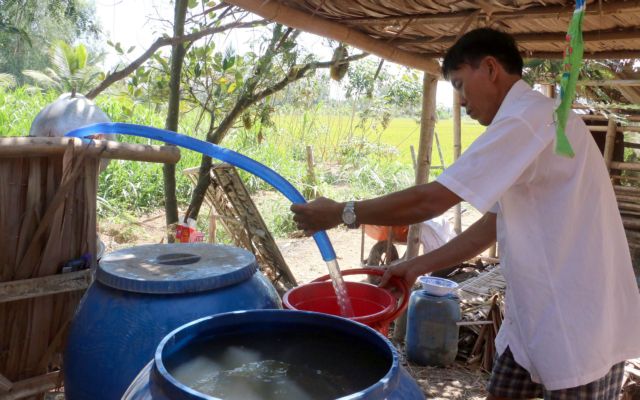 Society
Society

From dusk till dawn, roaming districts of Giồng Tôm and Ba Tri in the Mekong Delta province of Bến Tre, are dozens of tractors delivering freshwater to local households.

|
| A man gets freshwater from a refill station in Ba Tri District. — VNA/VNS Photo Trần Thị Thu Hiền |
MEKONG DELTA — From dusk till dawn, roaming districts of Giồng Tôm and Ba Tri in the Mekong Delta province of Bến Tre, are dozens of tractors delivering freshwater to local households.
Burdened with massive debts due to crops impacted by saline intrusion, people in the Mekong Delta are now also forced to spend money on freshwater to survive this year’s devastating drought.
“Have you shipped water to my house?” Bảy, a farmer in Giồng Tôm District, called to ask a provider just to know that how long she would have to wait.
“Water ran out yesterday so I have not taken a shower yet,” Bảy told the online newspaper Vietnamnet. “If they do not deliver freshwater this afternoon, I may have to carry a bucket to my neighbour, asking for water.”
People of Giồng Tôm District said their lives were turned upside down after the Tết (Lunar New Year) Holiday, as either tap water or spring water had high salinity, while no households stored freshwater in tanks for daily use.
Vân, owner of a café in the district’s Bình Thành Commune, said tap water had tasted salty for months.
“It costs me VNĐ10,000 (43 US cents) a day to buy bottled water for brewing coffee and tea for sale,” she said.
“My son-in-law had workers from Tiền Giang Province drill a well in search of freshwater, but failed. My husband attempted it, but could not find a good source of water,” she added.
Vân is among “independent” residents as her family owns a tractor which her son drives daily to take freshwater from a well 3km away from her home for cleaning and showering.
“It costs VNĐ150,000 (US$6.48) for a cubic metre of water delivered to your doorstep, while the expense for bringing water home on our own is only VNĐ50,000 ($2.16),” said Vân.
Sitting in the scorching sun while observing a canal in front of his house, Tư Hiếu refrained from taking a dip as he would have to re-shower with freshwater.
“I may take a shower at the end of the day,” he said.
Thousands of people in Bến Tre Province have witnessed their lives slipping into the hands of water providers.
“The water shortage happens annually, yet it is more severe this year as saline intrusion happens a month earlier than normal,” said Hiếu.
Each family spends from VNĐ500,000 to 1.5 million ($21.6 to 64.8) monthly on fresh water.
“However, it is not always available,” said Lan in Bình Thành Commune.
“Sometimes it takes two to three days for a tank of water to be delivered, as providers prioritise early orders,” she added.
Emerging job
While his neighbours lose sleep over water, Nguyễn Văn Tẩm is lucky enough to hit a source.
“Unable to afford the high cost of freshwater, I had workers drill a well, hoping to find drinkable water underground. Fortunately, the dream came true,” said Tẩm.
“Well water is for cleaning and showering, collected rainwater is for cooking. Last week, when my grandchildren from HCM City came to visit us, I let them use rainwater to shower so it ran out,” he said.
In front of Nguyễn Thị Thuỷ Tiên’s house in Tân Hoà Village, Bình Thành Commune, there is always a crowd waiting to pump water.
A month ago, Tiên had a well drilled. Her neighbours followed yet were unable to find any groundwater.
“It is God’s will,” said Tiên. “Since then, people have come here to buy water for their families or for resale.”
Tiên sells a cubic metre of water for VNĐ20,000 ($86 US cents).
Phạm Minh Trọng, Tiên’s customer, said tap water at home was too salty to use.
“Four family members use a cubic metre of water a day. We try to save as much as possible,” he said.
Driving a pickup truck along burnt paddy fields because of saline intrusion, Thanh Phong, a water trader, tries to finish all orders before twilight.
“I buy freshwater from a local well then provide it to people. It depends on the distance that I set prices for a tank of water. As most of people here are poor, prices cannot be too high,” said Phong.
As this year’s rainfall is predicted to drop, many local residents expressed the wish to have enough of water to survive the dry season. — VNS




